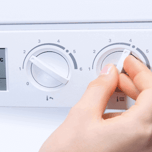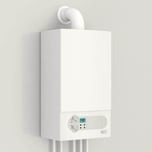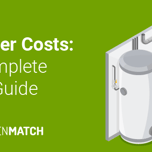Answer these simple questions and we will find you the BEST prices
Which type of solar quotes do you need?
It only takes 30 seconds
100% free with no obligation

Get up to 3 quotes by filling in only 1 quick form

Slash your energy bills by installing an energy efficient boiler

We’ve helped over 500,000 homeowners reduce their carbon footprint
- GreenMatch
- Boilers
- Conventional
Conventional Boiler System in the UK: Prices, Pros & Cons (2025)

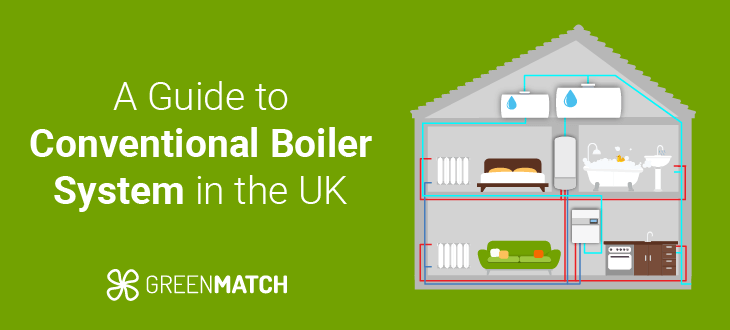
- A conventional boiler is a traditional heating system that provides central heating and hot water with the help of an additional cold water tank and hot water storage cylinder.
- Conventional boilers cost £1,600 - £5,500 in the UK.
- The biggest benefit of conventional boilers is the ability to handle high demand for heating and hot water.
A conventional boiler, also known as a regular boiler or a heat-only boiler, is a traditional heating system suitable mainly for large houses. These units are among the oldest types of boilers around; however, it doesn’t mean they are outdated models. Today, these high-capacity boilers have an energy efficiency of 92%-94% and last up to 12-15 years on average.
In this article, we will walk you through how conventional boilers work, along with their features, pros, cons, and prices. If you are ready to install a conventional boiler in your home, Greenmatch can help you get in touch with trustworthy local boiler installers quickly, a process that would otherwise take hours of your time.
All you have to do is fill out a short 30-second form to get 3 free and non-obligatory quotes from our network of vetted installers. Click the button below to get started!
- Quotes from local engineers
- Payment by finance available
- Save up to £975
It only takes 30 seconds



What is a conventional boiler?
You might be wondering how a conventional boiler is different from a combi boiler or a system boiler. Conventional boilers produce heat for your central heating but cannot provide hot water directly for taps or showers. This is why they are also called heat-only boilers.
To do the full job (providing heat for your central heating system and hot water for domestic use), they need a large cold water feed tank in the loft and a hot water storage cylinder, usually stored in a cupboard. Conventional boilers take their water from this cold feed tank, unlike system and combi boilers which take it directly from the water mains.
Therefore, a conventional boiler will take up more space around your home than a combi boiler, which is a singular unit. However, having a hot water storage cylinder is precisely the feature that allows conventional boilers to provide hot water to multiple hot water outlets at the same time. The bigger the cylinder, the higher the domestic hot water demand your conventional boiler can meet.
How does a conventional boiler work?
A traditional boiler has the following components:
- Boiler unit
- Cold water feed tank
- Expansion tank or expansion vessel
- Hot water storage cylinder
So, how does a conventional boiler work?
To provide heating, cold water from the tank in the loft feeds down to the boiler. This water deposit is typically positioned as high above the boiler as possible to improve the water flow. When the boiler fires up, a heat exchanger inside warms up that cold water before it is pumped to the radiators or the hot water cylinder.
Once in the cylinder, the water will be further heated and stored to be sent directly to the taps/showers as needed. You can use multiple hot water outlets simultaneously without experiencing a decrease in the hot water flow or its temperature. However, if you use too much hot water, you may need to wait for the cylinder to refill (this can take between 25 mins and 1 hour).
The two types of conventional boilers are open vent boilers and sealed boilers. The difference between them lies in how they handle water pressure and air. Open vent systems are open to atmospheric pressure and use a vent pipe to get rid of excess pressure and air. These systems have a feed and expansion tank to maintain water level and expansion when water is heated.
Whereas, in sealed boilers, the expansion vessel is used to accommodate water expansion. These boilers are ideal for houses with no loft space as they take up less space.
Conventional boiler diagram
Conventional boiler operation process:
- Cold water supply: Cold water is stored in the feed tank in the loft or other storage area above the boiler unit. The tank collects water from the water mains and supplies it to the boiler.
- Heating process: The boiler heats up the water from the feed tank with the help of the heat exchanger.
- Central heating: The heated water is circulated into the boilers for central heating.
- Hot water supply: Hot water is stored in the hot water cylinder to supply outlets such as taps and showers.
Conventional boiler prices
Several factors affect the cost of a new boiler in the UK. The average cost of a new conventional boiler in the UK, including installation, is £1,600 - £5,500. The average installation cost is £3,550.
| Conventional Boiler Costs | |||
|---|---|---|---|
| Household size | Energy output | Boiler unit cost | Average cost (including installation costs) |
| Small (1 - 2 bedrooms, up to 10 radiators) | 9kW - 18kW | £600 - £1,600 | £2,600 |
| Medium (2 - 3 bedrooms, 10 to 15 radiators) | 18kW - 26kW | £700 - £2,200 | £2,950 |
| Large (4 - 5 bedrooms, 5 to 20 radiators) | 26kW - 40kW | £900 - £3,500 | £3,700 |
Prices include gas, oil, and LPG models. Installation is priced at £1,500 for demonstration purposes. All prices are estimates only.
In addition to these costs, there are some maintenance costs involved. The annual servicing costs could be anywhere from £65 to £300, depending on the boiler company. If you need to replace some parts or need to do extra maintenance, such as power flushing, the costs would increase accordingly. This can also vary based on the availability of parts in your region.
While this guide can equip you with cost estimates, it is recommended to compare quotes from at least 3 installers to find the best deal. Save hours of your time by using Greenmatch’s streamlined service to get free and non-obligatory quotes from up to 3 vetted local installers.
Click the button below to get started!
- Quotes from local engineers
- Payment by finance available
- Save up to £975
It only takes 30 seconds



Conventional boiler system pros and cons
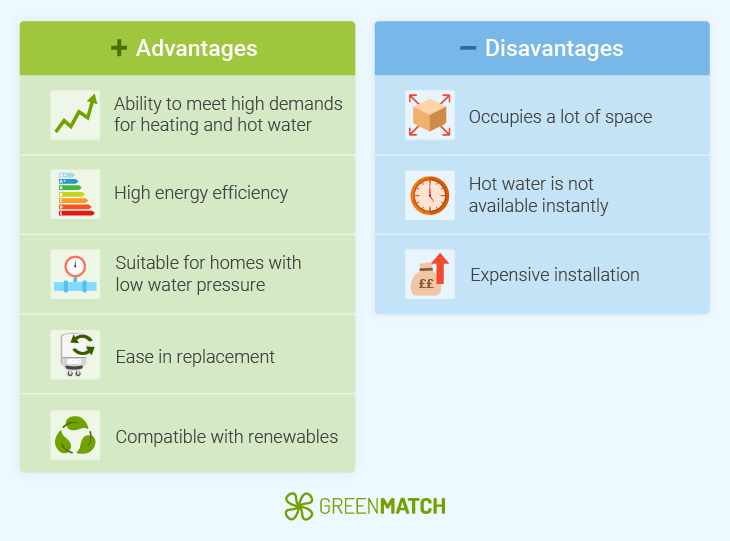
Advantages of conventional boilers
- Ability to meet high demands for heating and hot water: Due to its large storage capacity, a conventional boiler is a great choice if you live in a home with several bathrooms and a high demand for heating and hot water.
- High energy efficiency: Condensing technology has improved conventional boilers’ efficiency (up to 94% for some models). A condensing boiler can help you reduce your heating bills and also your home’s energy consumption.
- Suitable for homes with low water pressure: The gravity-fed water circulation system eliminates the dependence on pressure from water mains. Moreover, the hot water storage cylinder ensures the availability of hot water without a drop in water pressure when multiple water outlets are used simultaneously.
- Ease in replacement: Conventional boilers are compatible with older plumbing and heating systems. You won’t need to adjust the pipework or remove components such as the cold water feed tank, making the installation process easier and cheaper compared to other types of boilers.
- Compatible with renewables: Many regular boilers are compatible with solar thermal panels. This gives you a chance to make the heating process eco-friendly.
Disadvantages of conventional boilers
- Occupies a lot of space: Conventional boilers are not suitable for homes with limited space because they need extra components (cold water tanks and hot water storage cylinders) in addition to the main boiler unit.
- Hot water is not available instantly: Even though you can get hot water from multiple taps or showers at the same time, you will have to wait until the cylinder refills if you use all the hot water at once. Houses with larger demands for hot water may require larger-capacity cylinders.
- Expensive installation: A new conventional boiler installation can be costly, requiring separate parts to be installed throughout the house. You may also need pipework fitting or replaced, adding more time and cost to the job.
At the same time, when it comes to domestic heating, low-carbon systems such as solar panels in the UK, heat pumps, or biomass boilers are the most sustainable alternatives to gas boilers and electric boilers in the UK. However, we know that these are expensive alternatives.
Should you get a conventional boiler?
Does your house have a traditional heating system that needs to be upgraded with minimal costs? Do the water outlets in your home have low water pressure and does your house require large quantities of hot water, along with heating for several rooms? Is there enough space to accommodate water storage tanks in the house? If you answered yes to these questions, your house is ideal for a conventional boiler system.
If you want to replace your old conventional boiler but are not ready yet to switch to low-carbon systems because of technical or financial reasons, then consider installing a highly efficient conventional boiler based on condensing technology. A new boiler will burn less fuel to achieve the same result and reduce your home’s carbon footprint at the same time.
If you have made the decision to get a conventional boiler for your house, we recommend getting in touch with experienced professionals to oversee the installation process. It can be a tedious and time-consuming task to spend hours calling up different installation companies on your own. Instead, you can use our hassle-free service and get in touch with vetted technical experts.
Get up to 3 free, no-obligation quotes from installers in your area by filling out our short, 30-second form. Click the button below to get started!
- Quotes from local engineers
- Payment by finance available
- Save up to £975
It only takes 30 seconds



FAQ
A conventional boiler is a traditional heating and hot water system suitable for large houses. Conventional boilers work with the help of an additional cold water feed tank (placed in the loft above the boiler unit) and a hot water storage cylinder (placed downstairs).
Yes, modern conventional boilers can be an efficient replacement for an old, existing model. However, they need space for a water tank in the loft, the boiler unit and a hot water storage cylinder, which can be expensive if not already installed.
System boilers are considered a more compact version of conventional boilers as they take cold water from the mains rather than from a tank in the loft.
If your heating system has a separate cold and hot water storage tank, then you have a conventional boiler. A combi boiler is an all-in-one unit that does not need extra components such as feed tanks or hot water cylinders.
A conventional boiler lasts 12-15 years on average and usually has a warranty between 2 to 12 years.

Anjana has a knack for simplifying complex concepts in an engaging way. She has a background in digital journalism and is committed to delivering impactful content about sustainability and solar energy.
We strive to connect our customers with the right product and supplier. Would you like to be part of GreenMatch?

- Quotes from local engineers
- Payment by finance available
- Save up to £975
It only takes 30 seconds





